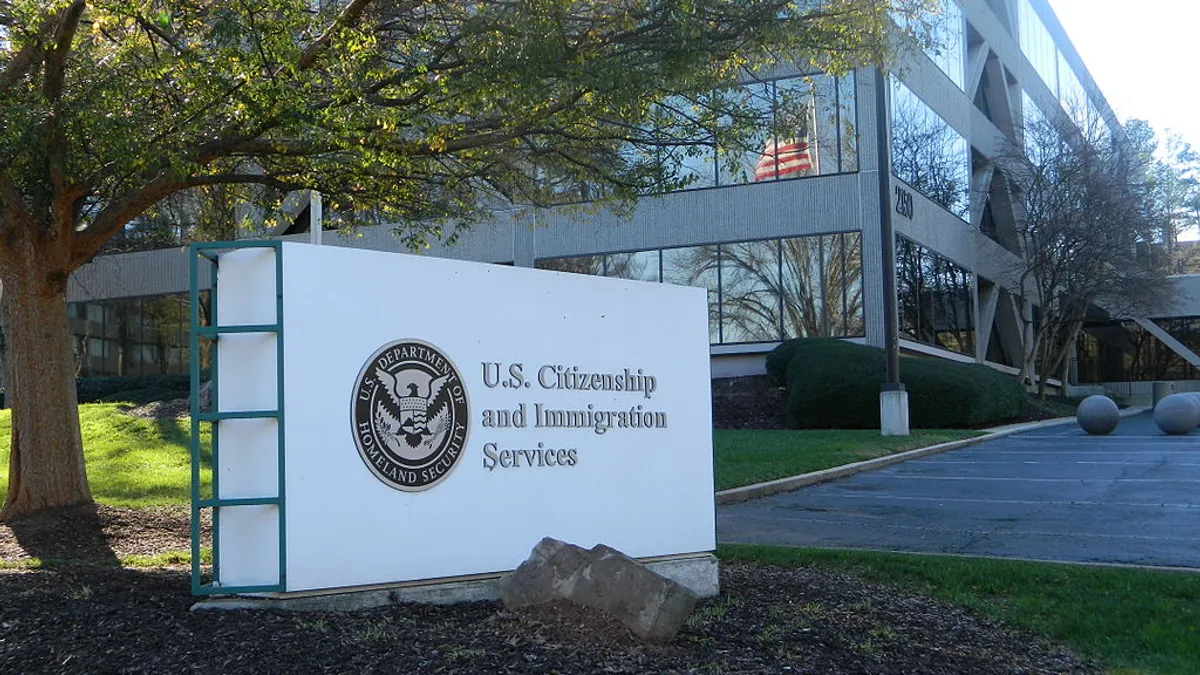Through policy, the Trump administration has made it clear it is looking to minimize employer use of the H-1B visa program, the immigration pathway for highly-skilled foreign nationals to help meet key talent needs in tech, healthcare, and finance, among others. Talent consultants, researchers and employment attorneys say the administration’s continuous effort to complicate the process for hiring this talent has caused "a lot of frustration" for employers.
"It shakes the whole core of the organization," Eileen Scofield, an attorney in Alston & Bird’s labor and employment group, told HR Dive. "It incentivizes them to go and build their infrastructure someplace else where they don't have to worry about losing key people."
In the early months of the pandemic, the administration declared a series of cessations of entry for H-1B applicants and other foreign nationals, citing public health and labor market concerns. Gary Shapiro, president and CEO of Consumer Technology Association, a technology trade group, said the first ban in April "could not come at a worse time."
In June, Trump issued an executive order halting the issuance of new H-1B visas for the rest of 2020. In August, USCIS proposed an updated fee structure that was recently rejected by federal courts.
In early September, the administration proposed two more regulations it is hoping to finalize before the end of the year. One would narrow the definition of the occupations eligible for the skilled-worker visa and the other would increase the wages employers would have to pay to these workers, to prevent them from "undercutting" U.S. workers, according to multiple members of the administration, including Labor Secretary Eugene Scalia.
"There’s been concern for a long time that the wages at which H-1B workers are allowed to be brought into the country are too low and are undercutting U.S. workers’ wages," Scalia told Reuters. "That’s never acceptable, but totally intolerable when you’ve got millions of Americans still out of work because of the pandemic."
The idea that immigration is placing a strain on the labor market may not have much basis in data, according to Dick Burke, CEO of Envoy Global. Burke pointed out that while 85,000 new H-1B visas are issued in a normal year, the extent of the demand for these visas significantly outpaces the supply, as is the case with demand for workers in these fields. Alka Bahal, partner and co-chair of the Immigration Practice Group at Fox Rothschild LLP, said via email that "[t]he denial rate for H-1B petitions for initial employment increased from 6% in FY 2015, before Donald Trump took office, to 29% through the second quarter of FY 2020, according to a recent analysis from the National Foundation for American Policy [NFAP]."
That the H-1B visa has a profound impact on pandemic-driven unemployment is also unlikely, as research from NFAP suggests. The unemployment rate in technology, for example, one of the major fields where the H-1B is used, is in the single digits, and those with advanced degrees are generally in a better position to find new jobs. Healthcare is also experiencing shortages that are expected to get worse in the coming years.
On Sept. 24, the administration announced federal funding to retrain American workers for "middle- to high-skilled H-1B occupations." While some have questioned the need for these retrained workers to replace H-1B holders, Burke and domestic labor advocates say that investing in workforce retraining can be beneficial.
"We felt like the underlying grant requirements, in terms of the strategies to be used and the industries to be targeted, [were] fairly consistent with what we've seen from other grants over the years," Kermit Kaleba, federal policy director at The National Skills Coalition, told HR Dive, pointing out that the H-1B program has had a portion of its fee revenue allocated to Department of Labor workforce training grants since the late-1990s. "I think they're the right strategies to be pursuing."
But Kaleba’s skepticism lies in the ability of these programs to reverse the disruption caused by the pandemic. The healthcare industry was a notable omission among the industries targeted for the federally-funded training, he said. He also stated concerns around the programs’ ability to address the disproportionate impact of the pandemic and ensuing unemployment on non-White communities, specifically, whether the grants are "being offered with a mind towards ensuring that we're funding programs that actually are taking meaningful steps to try to reduce those inequities in access and in outcomes."
Particularly given the disproportionate impact of the pandemic on the populations Kaleba highlighted, he said the federal government could be more deliberate about helping them, for the benefit of businesses and the workforce. "We definitely would like to see this administration and Congress making more of a concerted effort to make sure that we're dismantling those barriers and making sure that [they] are reducing inequities in their workforce and career advancement opportunities," Kaleba said.
In some situations where acquiring an H-1B is too complicated or burdensome, employers are seeking alternatives to meet talent needs — often in the form of "employers of record" and "globalization" consulting firms that send full-time equivalents to work on-site for clients. Companies may view this as a faster alternative, though it is one that may be murky legally.
"I know that it is utilized because of the need to immediately staff projects that are really important to the company’s bottom line," Scofield said, adding that the government does attempt investigations to root out these kinds of workarounds.
The strategic value of top talent remains the important lever driving this activity and demand for international workers. Ultimately, the United States’ restrictive immigration policies could be creating jobs outside of the country, either by companies relocating operations or hiring companies to workaround the current immigration process, as Burke, research leaders, a prominent tech CEO and media reports have suggested. U.S. employers were moving jobs to Canada, for example, even before the pandemic.
"We have seen real problems with employers who have devoted thousands or millions of dollars on a project and then find out a key person or lead personnel of a department are unable to stay. It’s not talent they can easily replace," Kerri-Ann Griggs, attorney at Alston & Bird, said.
Wharton Business School professor Britta Glennon even went as far as to call current immigration policy "the United States’ loss and the rest of the world’s gain." She wrote for the Brookings Institution that her recent research revealed "U.S. multinational companies have already offshored tens of thousands of jobs and opened new foreign affiliates in response to H-1B visa restrictions much less severe than those being implemented now."
"There's no reason to do this," Scofield, Griggs’ colleague, added. "If you have an alternative, why do you want to deal with the government, pay filing fees, have all of these unknowns, all these variables, all that stress? There’s no reason to do it unless there’s a legitimate business reason such as the talent need."




















